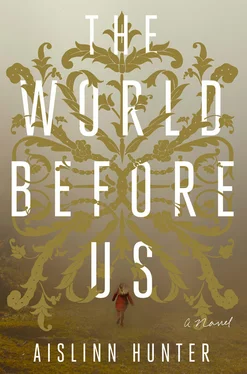“One what?”
“You said before that you’d been in love three times.”
Jane laughs. “Well, the other two weren’t quite reciprocated, so they might not count.” She drinks the last of her pint and he watches her set it down as if calculating the likelihood of getting her to stay for another.
“But you live alone now?”
“I do. Well, me and the dog.”
He is watching her mouth move and it makes her self-conscious — because she likes it and because it makes her feel like some twenty-year-old version of herself that she never got to be.
“What about you? I’m guessing you live with your parents?”
He stands up, takes their empties in his hand and put his lips to her ear. “If I lived on my own, do you think we’d still be here?”
When they leave the pub Blake holds the door open and lets her go through first. Then he drops his hand to her waist to guide her to the right before she can say good night and head left toward the inn. He jerks his chin toward the church and the falls, says, “It’s nice out,” and just as Jane is about to say, I should probably go, it’s late , he threads his hand into hers and pulls her gently along. When they get to the field that divides the falls and the Farrington trail from the estate he takes the path up along the stone wall that runs beside Inglewood House.
All night Blake has wanted to touch her. Jane sensed it, and she saw that his father noticed it and was uncomfortable with it, that Blake’s neighbours sitting next to them had picked up on it too. The woman had caught the clasp of her bracelet on Jane’s sweater when she rose tipsily from the bench and tried to move between the tables, had laughed nervously as she tried to release it. Jane blushed and looked at Blake and shook her head because she knew what his neighbours, what everyone, was thinking.
Halfway up the path, near the spot where Jane had climbed the wall, with the sloped roof of Inglewood House’s stables silhouetted between oak trees, Blake stops and kisses her, his hands in her hair, body pressed against hers. She doesn’t pull away, and when he senses that she is letting it happen, when she kisses him back, he kisses her even harder.
Jane closes her eyes, feels his warmth against her, tastes the tang of beer in his mouth. This is how it begins, she thinks: a door opens and you step in or out of it, or you stand still with a bar of unexpected light at your feet and you wait to see if the sun inching over your legs, your arms and your face, feels good; if it does, you go in.
They end up on the grass. He moves on top of her for a second and then he pulls away, says, “Wait here.” He’s up and over the wall before she even knows what’s happening; when he comes back two long minutes later, he has a blanket from the stables.
“Listen, Blake—” She stands, presses her fingers against her temples. It’s ridiculous: he is a kid, she is a grown-up, and when he cleared the wall she had a feeling he’d done this a dozen times before. That makes this encounter seem an even worse idea than it already is.
He drops the blanket around the back of an oak whose low branches span the field on one side of the wall and the grounds behind the stables on the other. Then he stands ten feet away from her undoing the buttons of his shirt. Underneath his shirt he’s wearing a white T-shirt; a spiky black tattoo is banded around his left arm just above his elbow. He loops the T-shirt over his head and then unzips his trousers and when he is down to his underwear and socks he just stands there in the cold night air looking more grown-up than he should. When Jane doesn’t move closer or move away, he comes over to her and lifts her sweater over her head. He kisses the front of her neck and under her chin, traces her collarbones with his thumbs. Then he leads her over to the blanket, lifts her skirt and runs a track of kisses up her thigh, the woods pulsing around them, a salt taste on her lips from his skin. He has a condom in his wallet and that surprises her, but when it takes him a few tries to tear it open with his teeth, he says, “Go ahead and laugh,” and she does, and everything between them slows down, becomes more intentional.
There are human experiences that we can remember, and sensations we can sometimes glean. We often lean toward or away from things because of a desire or unease.
When Blake kneels in front of Jane and Jane puts her hands in his hair, one of us goes for a walk with the children, one of us wanders into the woods to be alone, and some of us stay to watch, the poet behaving rudely even as his voice lets slip a kind of grief. Those of us present are trying to remember our own wants and needs, the ways we were loved, what acts, or what kinds of touch shaped us.
When they are finished, Blake leans over Jane to keep her warm, rubs her arm with his hand, stopping to trace her nipple with his finger. “I can get another blanket.”
She kisses him because he is a good kisser, because he is sweet, because for the last hour she has only been here ; and because he is a gentleman who wants to bring her another blanket that will smell of dust and old straw, who paid for their drinks with the only ten-pound note left in a wallet that had a strip of Velcro on it.
“It’s okay, it’s late, and I have to get back to Sam.” Jane slips into her skirt. We watch her and think, Yes, it is late, late for us too . We also want release: we are tired of scattering ourselves into todays and yesterdays, tired of being in this woods now and a hundred or so years ago all at the same time. How long have we been trying to concentrate? For the last hour Jane has been aware of nothing but what it feels like when a finger trails down your spine, when a chest reverberates against yours with laughter, when a twitch turns into a tremor inside you. She has had what we want: to be wholly in one place with no thought outside of it. Though once, pushing into her, Blake called out “Helen,” and she quivered, put her mouth against his ear but remained silent.
This , we thought, is how you reinvent yourself. This is how you disappear .
The summer of 1877 was the wettest anyone at the Whitmore could remember and the strain of the confinement was felt by everyone. In June the kitchens were low on meat one week and short of sugar the next. In July the Commissioners did not come by to register receipt of the patients’ complaints, and so a revolt against flock-picking ensued. The poet’s wife had visited to advise the poet that he would soon be released, and he’d upended a table, smashed a vase and was sent to the refractory ward for a week. Those who enjoyed his poetry brooded. All summer there were rumours of cholera in the village, which meant that no escorted walks were permitted, although walks under parasols had been promised. The world was topsy-turvy: the countryside was soaking wet, yet the ferns in the Whitmore’s front gallery were dying of thirst. For a fortnight the patients lined the windows, quietly seething.
In the middle of those weeks of endless rain, Superintendent Thorpe conceived of a competition that he hoped would enliven the general mood in the hospital and motivate the patients to behave. The idea was to create a series of pleasure gardens — twenty small plots to be assigned to selected patients who would be given sole care of their budding tenants. By early July the garroted vine had been dug out of the hillside by two perpetually soaked attendants, and by mid-month the plots were bordered with box and further divided by narrow gravel walkways, each gardener’s name to be painted on a zinc plate and hung from a wood post at the entrance.
Читать дальше












